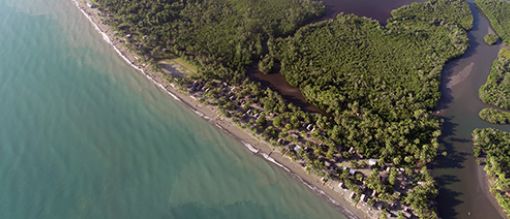Following the deadly earthquake on Sunday 11 September 2022 measuring a magnitude of 7.6, with the epicenter in Morobe Province, a coalition of PNG and Australian civil society organisations are calling for all levels of government to pause all moves to progress the Wafi-Golpu mine project until this geological phenomenon is fully understood, and until communities of Morobe Province have been adequately consulted, including being made aware of the risks of DSTP to their communities, livelihoods and health.
Mr Peter Bosip, Executive Director, CELCOR, said:
This earthquake ranks among the highest of magnitudes ever recorded for an earthquake in Morobe Province. We are deeply concerned there will be many more as Morobe Province is on the active Ramu-Markham faultline. If the 130 kilometre long DSTP pipeline proposed for Wafi Golpu had been operating on the weekend, it is unknown how many landowners would have seen their land and gardens covered in toxic mining waste, or how many streams and rivers would have been polluted.
The power of the earthquake is shown in the destruction it has caused to buildings and infrastructure and the many lives tragically lost, and urgently demands an assessment of what could happen if something like the DSTP pipeline is built for Wafi Golpu.
The proposed 130km DSTP pipeline for Wafi Golpu plans to go through many village communities of Morobe province, through the city of Lae, crossing watercourses and important agricultural land and forests, before dumping millions of tonnes of waste into the ocean. The pipeline will carry toxic mining waste that includes heavy metals such as arsenic, lead and mercury.
Mr Bosip said:
Alarm bells are well and truly ringing. Morobe has the highest population of any province in PNG. With Morobe prone to high magnitude earthquakes, there is a significant risk across the entire proposed 130 kilometre length of pipeline of the pipeline breaking, spilling mining waste and devastating the province.
Reverend Yasam Awara, Head of Jabem District of the Evangelical Lutheran Church of Papua New Guinea, said:
Wafi Golpu’s proposed pipeline would carry 360 million tonnes across our province over at least 28 years. That is a risk that the people of Morobe would have to bear, everyday – and that price is far too high for us.
PNG organisations, the Centre for Environmental Law and Community Rights (CELCOR) and the Evangelical Lutheran Church of Papua New Guinea, and Australian organisations Jubilee Australia and the Mineral Policy Institute made the urgent call to all levels of government for a pause on Wafi Golpu’s schedule in response to the Morobe Governor’s recent announcement that the legal cases against the Wafi Golpu Project lodged by the former Morobe Provincial Government will be withdrawn, and that the special mining lease will be signed in December this year.
Mr Bosip said:
We are dismayed that the new Morobe Government has taken this backwards step as one of its first. Respect for the environment, and respect for the communities which this Government serves, would demand otherwise.
Reverend Yasam Aiwara said:
Our parishioners depend on the Huon Gulf entirely for their lives. Planning to dump millions of tonnes of mining waste into the ocean – which includes arsenic and lead – and to not adequately consult with them about it, is completely irresponsible. Anything that harms the livelihood of the people of the Church, we as a national Church, say no.
The organisations also called for the release of the Independent Review conducted of the Wafi Golpu Environmental Impact Statement (EIS), which has never been made public by the national Conservation and Environment Protection Authority (CEPA).
Mr Bosip said:
The people of Morobe, and the government of Morobe, deserves to have all of the available information before them, before committing to a decision of this scale. The impacts of Wafi Golpu upon future generations will be immense. We must get this right now so that they do not pay the price.
Further, no proper baseline of a social, environmental or economic nature has been developed of the Huon Gulf by the companies, meaning that if anything were to go wrong with Wafi Golpu DSTP, there is no proper way it could be investigated or measured.
Deep-sea tailings placement (DSTP) is used by less than a handful of countries in the world, and its impacts are still being understood by scientists.
Reverend Yasam said:
The message to our government is simple: don’t let the Huon Gulf become an environmental experiment for the mining industry.
“The legacy that we want to leave for our children, and for our grandchildren, is a simple one. We want them to be able to live in an environment that is clean, healthy and safe. We do not want them to suffer the consequences of choices we make today: to be left with an ocean full of toxic waste, sick from being exposed to heavy metals and unable to support their families. No! The ocean is our life, it is not a dumping ground, and neither are we.”
The Wafi-Golpu Joint Venture is run by Newcrest PNG2 Limited and Wafi Mining Limited, which are both subsidiaries of Australian companies: Newcrest, and an Australian subsidiary of South African company, Harmony Gold. An Environmental Permit lasting 50 years has been granted to the Wafi Golpu Joint Venture. Over its life, the mine will produce 360 million tonnes of tailings waste, the majority of which, if not all, will be dumped directly into the beautiful waters of the Huon Gulf.
